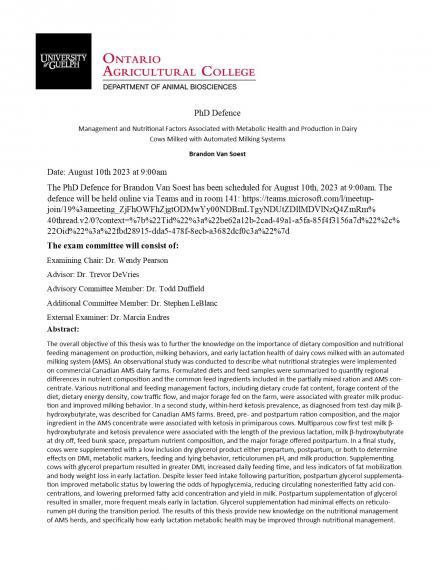Brandon Van Soest's Phd Defence
Date and Time
Location
Room 141 and Teams: https://teams.microsoft.com/l/meetup-join/19%3ameeting_ZjFhOWFhZjgtODMwYy00NDBmLTgyNDUtZDllMDVlNzQ4ZmRm%40thread.v2/0?context=%7b%22Tid%22%3a%22be62a12b-2cad-49a1-a5fa-85f4f3156a7d%22%2c%22Oid%22%3a%22fbd28915-dda5-478f-8ecb-a3682dcf0c3a%22%7d

Details
Management and Nutritional Factors Associated with Metabolic Health and Production in Dairy Cows Milked with Automated Milking Systems
The overall objective of this thesis was to further the knowledge on the importance of dietary composition and nutritional feeding management on production, milking behaviors, and early lactation health of dairy cows milked with an automated milking system (AMS). An observational study was conducted to describe what nutritional strategies were implemented on commercial Canadian AMS dairy farms. Formulated diets and feed samples were summarized to quantify regional differences in nutrient composition and the common feed ingredients included in the partially mixed ration and AMS con-centrate. Various nutritional and feeding management factors, including dietary crude fat content, forage content of the diet, dietary energy density, cow traffic flow, and major forage fed on the farm, were associated with greater milk produc-tion and improved milking behavior. In a second study, within-herd ketosis prevalence, as diagnosed from test-day milk β-hydroxybutyrate, was described for Canadian AMS farms. Breed, pre- and postpartum ration composition, and the major ingredient in the AMS concentrate were associated with ketosis in primiparous cows. Multiparous cow first test milk β-hydroxybutyrate and ketosis prevalence were associated with the length of the previous lactation, milk β-hydroxybutyrate at dry off, feed bunk space, prepartum nutrient composition, and the major forage offered postpartum. In a final study, cows were supplemented with a low inclusion dry glycerol product either prepartum, postpartum, or both to determine effects on DMI, metabolic markers, feeding and lying behavior, reticulorumen pH, and milk production. Supplementing cows with glycerol prepartum resulted in greater DMI, increased daily feeding time, and less indicators of fat mobilization and body weight loss in early lactation. Despite lesser feed intake following parturition, postpartum glycerol supplementa-tion improved metabolic status by lowering the odds of hypoglycemia, reducing circulating nonesterified fatty acid con-centrations, and lowering preformed fatty acid concentration and yield in milk. Postpartum supplementation of glycerol resulted in smaller, more frequent meals early in lactation. Glycerol supplementation had minimal effects on reticulo-rumen pH during the transition period. The results of this thesis provide new knowledge on the nutritional management of AMS herds, and specifically how early lactation metabolic health may be improved through nutritional management.